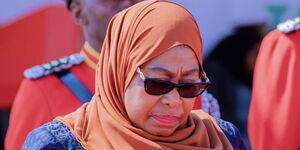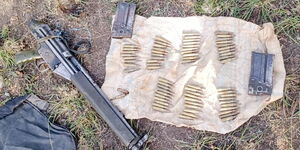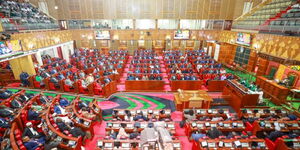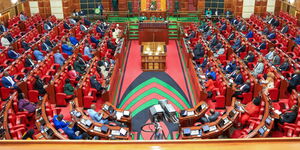As the world battles the Coronavirus pandemic that has claimed thousands, members of the public are taking precautions against the deadly microbe.
The World Health Organisation along with nations around the world have since stressed the need to maintain proper hygiene, proper sanitization of hands to prevent further spread by contact.
On Friday, March 13, 2020, Health Cabinet Secretary Mutahi Kagwe confirmed Kenya's first case of the Covid-19 virus.
Following the announcements, reports of members of the public shopping for sanitizers and basic household supplies started doing rounds online.
With a warning to refrain from random handshakes, maintain proper hygiene and self-quarantine, Kenyans flocked retail outlets, some which registered empty shelves.
Speaking to Kenyans.co.ke, Purity Murugi, who had gone to shop for sanitizers at around 5 p.m. on Friday, March 13 at Westlands was restricted to a purchase of not more than two bottles of handsanitizer.
"I was trying to buy more but, the attendants at the supermarket are saying you cannot buy more than two," Purity informed.
Images doing rounds online showed people in supermarkets stocking supply as they brace themselves for the pandemic. Food supply, hand sanitizers, toiletries, disinfectants dominated the purchases.
Health CS Kagwe reported that the confirmed Coronavirus patient had arrived in the country on Thursday, March 5, 2020, and was quarantined on Thursday, March 12.
Kenyans who took to social media posed questions about how the patient's family was doing.
Has the government traced her fellow travellers? How many people has she interacted with for the whole week she roamed free?
This further prompted members of the public to shop ahead, in a bid to minimise contact through sharing common and crowded spots in the country.
Shelves in major retailers of the country are running out of basic supplies, if images of empty wipes and toilet paper shelves are anything to go by.
However, members of the public are not to blame for the panic buys. Website dw.com, in an analysis, informed that the mind of a person is wary of an invisible threat. This makes one lose control, and one of the ways way to reciprocate and regain control ends up being through panic buys.
Members of the public are in a state of anxiety, resulting from fear of being infected and buying prevention material presents itself seems like a solution to prevent one from the virus.
And hence, the purchase of facemasks, sanitisers, detergents, disinfectants, food supplies and many others.
To ensure safety, Kenyans have been advised to wash their hands with soap and running water or drench their palms with alcohol-based sanitizers.
As a result of the panic buys, the Competition Authority of Kenya issued a statement warning against the hiking of prices and hoarding of products.
"It has come to our attention of the authority that following a pronouncement by the government of a confirmed Coronavirus disease (COVID-19) case, some manufacturers and retailers are contemplating collusive increases of prices and/or hoarding with the intention of subsequently increasing prices of various consumer goods," the statement read in part.
The authority asked members of the public to report cases of price increments to the authority.
Since the COVID-19 virus was first reported in the Chinese city of Wuhan in early January 2020, its residents have been warned of its adversities and necessary safety measures.
One of them is the need for self-quarantine if one suspects they have the virus, or if they recently travelled from an affected region for at least 14 days.












